

by Dan Eden
Selling Nuke Warheads Not New Accusation for Israel [Update: December 2011 - Israel stole uranium from U.S., about an entirely different episode where Israel is accused of stealing uranium from a Pennsylvania facility in the 60s.] Secret apartheid-era papers give the first official evidence of Israeli nuclear weapons being offered for sale.
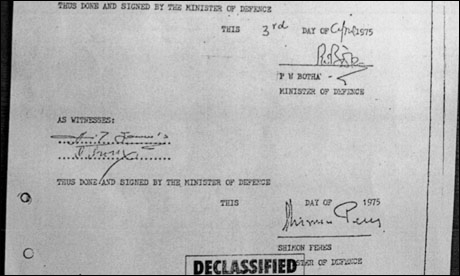 The secret military agreement signed by Shimon Peres [above], past president of Israel, and P W Botha of South Africa reveals that Israel offered to sell nuclear warheads to the apartheid regime, providing the first official documentary evidence of the state's possession of nuclear weapons.
The "top secret" minutes of meetings between senior officials from the two countries in 1975 show that South Africa's defence minister, PW Botha, asked for the warheads and Shimon Peres, then Israel's defence minister and past president, responded by offering them "in three sizes". The two men also signed a broad-ranging agreement governing military ties between the two countries that included a clause declaring that "the very existence of this agreement" was to remain secret. --Guardian UK, May 2010
Background: Article 9 of Japanese Constitution WWII ended for Japan with the dropping of two atomic bombs on the civilian population at Hiroshima, August 6th, 1945 and Nagasaki, 3 days later. Within the first couple of months following the bombing, 200,000 people were killed from the bombs [7], with 100,000 dying the moment the bombs exploded.
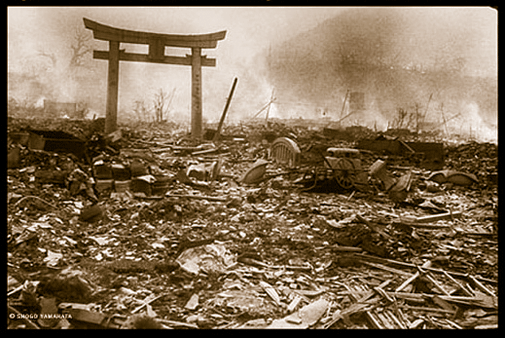 These days it is not uncommon for scientists to speak of the explosive effects of modern H-bombs in terms of hundreds of "Hiroshima's". Being the only country to experience a nuclear attack, the Japanese accepted a Constitution, written by the US occupation force, that contained a strong prohibition against nuclear weapons or aggression [below].
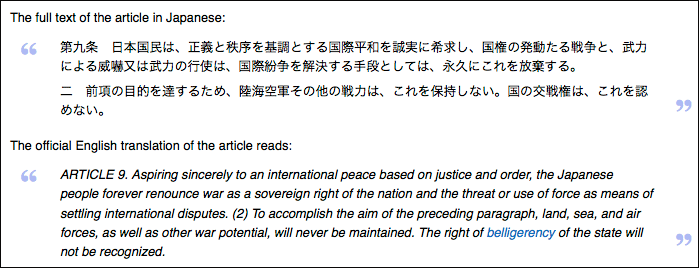 The Pentagon, as well as the Japanese people, would never tolerate a move towards arming Japan with nuclear warheads. Clearly, it is against the Japanese consent as well as their Constitution, yet Prime Minister Shinzo Abe allegedly initiated the deal, in part because of his fear of North Korea. But some in Japan argue that the provisions of Article 9 do not reflect the current political reality, or the powerful economic status that Japan now occupies. Polls show that the opinion on changing the Constitution are evenly divided. Japan already has close defensive and strategic ties, with about 50,000 U.S. troops still stationed in Okinawa, and a Treaty of Mutual Cooperation and Security that means Japan plays host to a carrier battle group, the 5th Air Force, the 3rd Marine Expeditionary Force, and sections of the Army's 1st Corps. Is this enough to protect Japan from a North Korean attack? It seems that the possession of nuclear weapons confers a more respected status among rogue nations, like North Korea, than having a charter devoted to peaceful coexistence. The threat of nuclear retaliation trumps written treaties and agreements. Prime Minister Abe knew this.
Japan's Prime Minister, Shinzo Abe
It was no secret that Abe wanted to modify Article 9 of the Constitution. He had spoken about it before and after his election.
Abe's fears were realized just 13 days into his presidency when North Korea exploded their first test hydrogen bomb.[6] It wasn't if anymore.
Abe's Resignation Speech Abe was so grateful for US support that he became one of the staunchest supporters of the US operations in Afghanistan. He went so far as to vow that he would step down if he failed to extend a Japanese naval mission supporting U.S.-led operations in Afghanistan, and opposition parties had been preparing to grill him on the topic in parliament. Opposition parties could delay legislation after winning control of parliament's upper house in the July 2007 election, so the extension was unlikely. At least that was Abe's stated reason for stepping down. His resignation speech may have hinted at something more passionate to Abe:
One can assume that he did not discontinue his "mission" and, in fact, accomplished it. But, as we'll see... not for long.
Vice President Dick Cheney's Visit to Japan Four months after the nuke explosion in North Korea, The Bush White House sent Vice President Dick Cheney to meet directly with Prime Minister Abe to discuss their mutual "needs". As reported by Yoichi Shimatsu in rense.com:
An unannounced reason for Cheney's visit was to promote a quadrilateral alliance in the Asia-Pacific region. The four cornerstones - the US, Japan, Australia and India - were being called on to contain and confront China and its allies North Korea and Russia.. From a Japanese perspective, this grand alliance was flawed by asymmetry: The three adversaries were nuclear powers, while the U.S. was the only one in the Quad group. [source] To further his own nuclear ambitions, Abe was playing the Russian card. As mentioned in a U.S. Embassy cable (dated 9/22), the Yomiuri Shimbun gave top play to this challenge to the White House : "It was learned yesterday that the government and domestic utility companies have entered final talks with Russia in order to relegate uranium enrichment for use at nuclear power facilities to Atomprom, the state-owned nuclear monopoly."
Here's the cable:
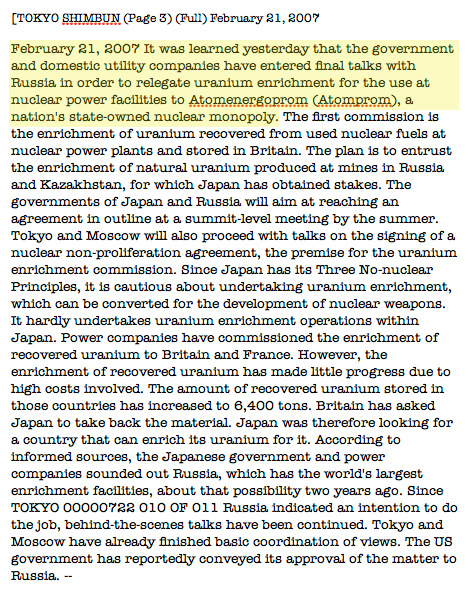 [source]
Cheney and Israel, Quid Pro Quo Dick Cheney was apparently comfortable enough to ask the Israelis to do some grand "favors" (like starting WW3)! Cheney spoke about Israel as if it were a super-secret branch of the US military! Look at this news bit from 2007:
What past dealings led to this depth of strategic cooperation? The relationship between Israeli leaders and Vice President Dick Cheney not only makes the clandestine transfer of nuclear warheads through this channel possible, but also highly probable.
 COMMENTS:
|
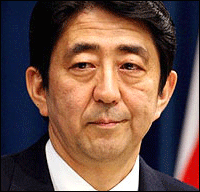 Shinzo Abe was the candidate of Japan's Liberal Party. Abe rose to prominence campaigning against North Korea for its abductions of Japanese civilians in the 1970s and 1980s to train its spies. Japan insists that some of them are alive and kept under wraps in North Korea. Abe won the presidency on September 26, 2006.
Shinzo Abe was the candidate of Japan's Liberal Party. Abe rose to prominence campaigning against North Korea for its abductions of Japanese civilians in the 1970s and 1980s to train its spies. Japan insists that some of them are alive and kept under wraps in North Korea. Abe won the presidency on September 26, 2006.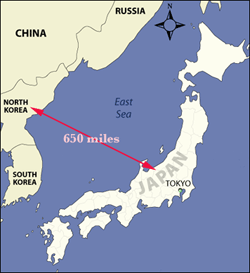 With a mere 650 miles separating nuclear missiles in North Korea from Tokyo, Abe wanted to be part of the alliance that would protect him. At the same time, Vice President Dick Cheney was promoting the Quadrilateral Alliance (US, India, Australia, Japan) to exert influence over both North Korea and China. Although holding a pivotal geographic position in the "quad", Japan is the only country with a defensive military with no nuclear weapons. It would seem a pre-requisite that Japan be given a bite from the "forbidden fruit."
With a mere 650 miles separating nuclear missiles in North Korea from Tokyo, Abe wanted to be part of the alliance that would protect him. At the same time, Vice President Dick Cheney was promoting the Quadrilateral Alliance (US, India, Australia, Japan) to exert influence over both North Korea and China. Although holding a pivotal geographic position in the "quad", Japan is the only country with a defensive military with no nuclear weapons. It would seem a pre-requisite that Japan be given a bite from the "forbidden fruit."  In early 2007, Vice President Dick Cheney flew to Tokyo with his closest aides. Newspaper editorials noted the secrecy surrounding his visit - no press conferences, no handshakes with ordinary folks and, as diplomatic cables suggest, no briefing for U.S. Embassy staffers in Tokyo. [
In early 2007, Vice President Dick Cheney flew to Tokyo with his closest aides. Newspaper editorials noted the secrecy surrounding his visit - no press conferences, no handshakes with ordinary folks and, as diplomatic cables suggest, no briefing for U.S. Embassy staffers in Tokyo. [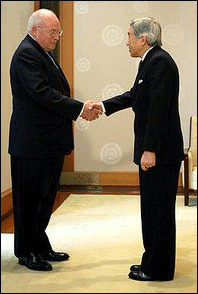 Cheney snubbed Defense Minister Fumio Kyuma, who was shut out of confidential talks. The pretext was his criticism of President George Bush for claiming Iraq possessed weapons of mass destruction. The more immediate concern was that the defense minister might disclose bilateral secrets to the Pentagon. The Joint Chiefs of Staff were sure to oppose White House approval of Japan's nuclear program.
Cheney snubbed Defense Minister Fumio Kyuma, who was shut out of confidential talks. The pretext was his criticism of President George Bush for claiming Iraq possessed weapons of mass destruction. The more immediate concern was that the defense minister might disclose bilateral secrets to the Pentagon. The Joint Chiefs of Staff were sure to oppose White House approval of Japan's nuclear program. If Washington refused to accept a nuclear-armed Japan, Tokyo would turn to Moscow. [emphasis added]
If Washington refused to accept a nuclear-armed Japan, Tokyo would turn to Moscow. [emphasis added]